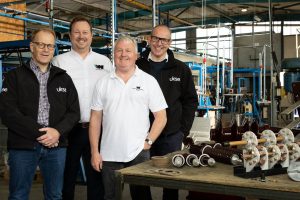How the UK can lead in the next generation of data-led innovation

By boosting the creation of quality data, improving the extraction of information and securing its use in smart manufacturing, the UK can build back a better, more sustainable economy, says Professor Kai Bongs, director of innovation, School of Physics and Astronomy, University of Birmingham.

Click here to secure your tickets for Invest Midlands
Historical data-driven innovation in the UK
The UK has always been at the forefront of using data and associated knowledge. 250 years ago, the application of quality data and knowledge to engineering made the West Midlands the birthplace of the industrial revolution.
220 years later, UK computer scientist Tim Berners-Lee invented the World Wide Web, and the UK became a leading player in the digital revolution. Now we need to harness data for the next industrial transformation, in areas like machine-to-machine communication and machine learning, where computer algorithms improve automatically through experience. Across many sectors, automation and digital transformation are moving to the core of business processes.
Click here to secure your tickets for Invest Midlands
The UK’s uneven investment in automation
Today, the UK remains one of the most under-roboticised industrial nations, with only 70 robots per 10,000 employees as compared to 300 in Germany and 700 in Korea. Advanced robotic manipulation could enable tasks such as recycling and re-manufacturing of products, to maintain more of the value in materials, and create a more circular economy. Examples include the recycling of magnets for electric generators and the dangerous and complex disassembly of electric vehicle batteries on the way towards a net-zero carbon economy.
Click here to secure your tickets for Invest Midlands
What does the future hold?
We have the opportunity to ‘build back’ with data-driven innovation. But in order to reap the benefits, we will also need to adapt IP protection and cybersecurity, to stand up in a data-intensive world, where every item constantly communicates with every other item.
We have to enhance the flow of expertise from GCHQ and their academic centres of excellence to businesses to protect our valuable data and consumer products, such as making sure car-fobs are safe against malicious manipulation. Further work is also needed to explain the decisions taken by data-driven algorithms to ensure that we understand when they may fail and how they may fail; and to ensure that they do not amplify existing inequalities that are embedded in the data on which they are trained and evaluated.
Click here to secure your tickets for Invest Midlands
The sustainability of data-driven innovation
While data-driven innovation supports the transition to low-carbon technologies, we need to tackle the energy consumption around the actual data processing. The carbon footprint of information and communication technologies has surpassed that of aviation and they are predicted to reach 20% of global electricity consumption by 2030, rising rapidly. To counteract this trend, we need a focus on how to transition innovations in energy decarbonisation into business endeavours, turning the cooling needs of data centres into smart heating opportunities for homes and driving energy from waste technologies.
Click here to secure your tickets for Invest Midlands
Improving our data to drive sustainable innovation
The next revolution is at our fingertips. After spearheading the industrial and digital revolutions, the UK is leading again; a £1bn investment has put the UK at the forefront of the Quantum Technology revolution. Quantum computation and communication will allow us to extract even more quality information from large data sets and communicate it safely.
Quantum sensors allow us to take a different look at data-driven innovation based on the quality of data. Instead of processing and power-hungry data mining, a novel sensor modality can deliver quality information much more directly and efficiently. This can significantly disrupt how we live and do business – similar to the changes arising from the 1940s invention of the radar system by researchers at the University of Birmingham, which provided unprecedented quality data of movements in the sky, underpins global air space control today, and may enable autonomous driving in the future.
Click here to secure your tickets for Invest Midlands
Alongside enhancements for safe urban flight with packet delivery drones and flying taxis, Quantum sensors can address productivity in the construction sector and support carbon sequestration with quality data about the underlying geology of the ground, allowing us to navigate under the sea to drive the blue economy, and provide new diagnostic tools for brain health in an ageing society.
Overall, by boosting the creation of quality data, improving the extraction of quality information and securing its use in smart manufacturing, UK business and academic partnerships can innovate more effectively together and allow us to build back a better economy for everyone.
***
Professor Kai Bongs is based at the School of Physics and Astronomy in the College of Engineering and Physical Sciences at University of Birmingham, he is College Director of Innovation, Principle Investigator of the UK Quantum Technology Hub Sensors and Timing, Chair in Cold Atoms and Lead of Midlands Ultracold Atom Research Centre.









